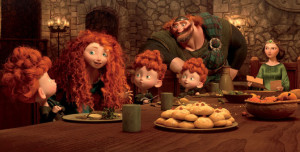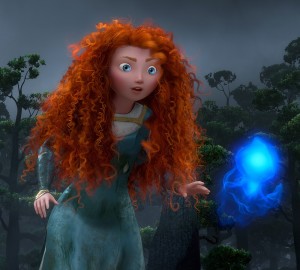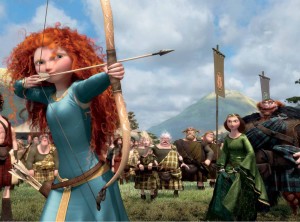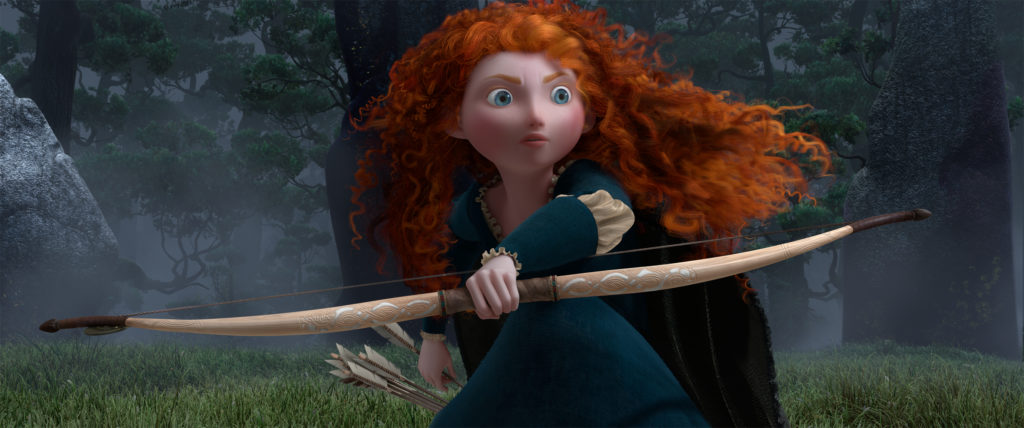If any movie franchise seems to be getting an uplift from the 3D craze sweeping Hollywood, Pixar may as well be leading the way. Planned re-releases of “Finding Nemo,” “Monster University,” “Beauty and the Beast,” “Monsters Inc.,” and “The Little Mermaid” are planned for 2012-2013. These stories have entertained kids and adults alike for years. However, 3D only enhances a picture, it cannot change it, and Pixar’s ability to push forth entertaining and graphically appealing animated movies is something that hasn’t really changed since their beginning.
Pixar’s latest effort, “Brave,” might be a misnomer given the scope of the movie, but works as an entertaining and touching view of a girl growing up in centuries-old Scotland. The title character, Merida (voiced by Kelly Macdonald, “No Country for Old Men”) is a spunky red-haired princess who would rather be anything but.
Her mother Elinor, (voiced by Emma Thompson, “Love, Actually”) is dead set on marrying her off to one of the 4 suitors from various tribes in Scotland, which Merida fights hair, tooth, and nail. She would rather wander the countryside, practicing archery (which she is quite good at, incidentally) than ‘settle down.’ Her father Fergus (voiced by Billy Connolly, “Gulliver’s Travels”) is rather un-involved, though he’d lay down his life to protect his family at a moment’s notice.
on marrying her off to one of the 4 suitors from various tribes in Scotland, which Merida fights hair, tooth, and nail. She would rather wander the countryside, practicing archery (which she is quite good at, incidentally) than ‘settle down.’ Her father Fergus (voiced by Billy Connolly, “Gulliver’s Travels”) is rather un-involved, though he’d lay down his life to protect his family at a moment’s notice.
“Brave” wanders somewhat aimlessly through its plot, which is rather undefined, but excels at its visuals and overall feel. As Merida meanders through the countrysides and mountaintops that are Scotland, the film looks less like a animated picture but something from a fantastic dream. Rolling hills, waterfalls, animals, and ‘whisps’ – magical creatures purported to lead one to his or her destiny – are painted with visual splendor.
The plot takes a turn when Merida, hoping to make her mother see things her way, asks a witch she finds in the woods for a spell to ‘change her’ but which ends up having less-than-desirable effects. A crux of the film is then devoted to Merida and Elinor attempting to patch up their relationship while trying to undo the effects of the spell. Thus begins a segment where mother and daughter begin to connect for probably the first time in Merida’s life.
 The movie makes some strong statements, but one of the problems with the script is that it doesn’t trust the exposition fully. While this may be a bit harsh given the movie’s key audience are children, some scenes rely on ‘telling’ too much instead of showing. For instance, as Merida helps her mother hunt for food while enchanted with the spell, Elinor must rely on her daughter’s skills, which she deemed ‘un-princessly’ before. “Princesses do not have weapons,” she says. However, instead of this lesson being imparted subtlety, Merida explains the lesson redundantly to the audience, which takes viewers out of the film partly.
The movie makes some strong statements, but one of the problems with the script is that it doesn’t trust the exposition fully. While this may be a bit harsh given the movie’s key audience are children, some scenes rely on ‘telling’ too much instead of showing. For instance, as Merida helps her mother hunt for food while enchanted with the spell, Elinor must rely on her daughter’s skills, which she deemed ‘un-princessly’ before. “Princesses do not have weapons,” she says. However, instead of this lesson being imparted subtlety, Merida explains the lesson redundantly to the audience, which takes viewers out of the film partly.
There’s also the case of Fergus, the might “Bear King,” who, while aloof, prides himself on his strength and protecting his family. However, certain scenes (and familial tensions) could have been completely avoided if the King had merely managed to listen to his daughter on several occasions. However, he is a loving fellow, and kids and adults alike will doubtless warm to him as he struggles to run his Kingdom with his wife while raising their spunky daughter.
As a side-note, “Brave” is fairly un-patriarchal, with the plot, and intention of the movie, about finding your own way, and with Fergus being an equal partner with his wife, with she not merely ‘His Queen.’ Perhaps not wholly necessary, I thought it was an important distinction, and point, for Pixar to hammer home.

All-in-all, “Brave” will doubtless please kids, but adults may find it both a little jumpy and short. The movie clocks in at 93 mins, but feels that it sails by much faster than that. However, the visuals show the marvels that Pixar, and animated movies in general have made in the genre, and will leave viewers feeling they have stumbled upon something truly magical. The characters are likable, and the movie makes a strong case for open communication between parents and children. And, if nothing else, the movie isn’t overly-predictable, which might make it enjoyable all by itself.
– by Mark Ziobro


